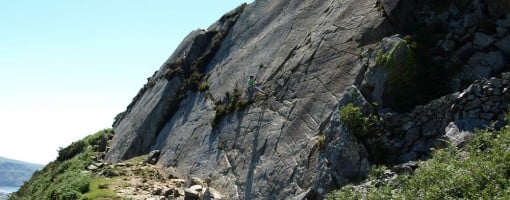
Climbs 41
Rocktype Gritstone
Altitude 213m a.s.l
Faces SE
Barmouth Slabs © Keri Murphy
Crag features
The nicely positioned LLECHAU'R GARN - aka ''Barmouth Slabs'' - are blessed with very easy access and good belays. The crag has 2 slabby tiers, with the best climbing found on the Lower Slab where a few of the routes are bold at the grade. Beyond the Upper Slab is the much smaller Gorllwyn Slab which has a few obvious lines but can be climbed anywhere at about Diff. The small North Crag is to the right of the slabs and is approached over scree. There is also some good bouldering potential on some of the outcrops above the crag as well as on the north side of the hill.
'New' routes are regularly claimed on these slabs, but the chances of finding virgin rock are pretty slim, particularly as the slabs have been climbed on since at least the early 1960s. What doesn't help matters is that the supposedly definitive CC Meirionnydd guide only lists a selection of climbs on the Lower Slab.
The crag is on access land and there are no climbing restrictions. Unfortunately the ease of access and the large number of easy routes mean that the crag suffers from considerable overuse by centre and other organised groups. At very busy times, it can be quite difficult to find 'free' routes as group leaders tend to selfishly rig whole sections for top or bottom roping. Best to get there early, or be patient, although a polite request to climb a specific route usually works too.
Approach notes
As you drive into Barmouth from Dolgellau, the A496 takes a sharp left just before the harbour. On the apex of the bend, there is a road leading off right, signposted 'Bae Abermaw Hotel'. Follow this uphill past the hotel to a parking area on the right about 3/4 mile further on. Park here. Then, on foot, follow the steep gated road opposite the parking area up the hill to the crag; about 500m and 10-15 minutes.
| The crag definitely isn't composed of rhyolite. Rhyolite doesn't occur anywhere locally. In common with the rest of the Rhinogydd, it's composed entirely of turbidite grits deposited in the Welsh Basin during the Cambrian period. These are known as the Harlech Grits. Not all Welsh mountain crags are exclusively formed of rhyolite either as some are formed of dolerite, basalt, microgranite etc Dave Williams - 11/Aug/18 |
|
| The crag definitely isn't composed of rhyolite. Rhyolite doesn't occur anywhere locally. In common with the rest of the Rhinogydd, it's composed entirely of turbidite grits deposited in the Welsh Basin during the Cambrian period. These are known as the Harlech Grits. Welsh mountain rock isn't exclusively formed of rhyolite either as there's also dolerite, basalt, microgranite etc. Dave Williams - 11/Aug/18 |
|
| This crag isn't gritstone, it's Rhyolite, like all other Welsh mountain rock. Just a bit rougher. Martin Bagshaw - 08/May/18 |
|
| Climbed quite a few of these routes Easter 2011 found the crag easily -there are good solid metal stakes for top rope anchors and terrific views from the base of the crag over the estuary. Great rock can make the climbs easy or hard as you like. Good for family groups with limited gear..Had agreat day! AidanBoyce1 - 25/Apr/11 |
Climbs at this crag
| Name | Grade | Stars | Type | Logs | Partner Ascents |
|---|
These climbs you have climbed by seconding or top-roping.
These climbs you have Dogged.
These climbs you Did not Finish.
Climbs are waiting to be checked by a crag moderator, and may not be accurate. Climbs can't be verified by a crag moderator, and they need more information to confirm it. Climbs are no longer climbable.
Moderators Updates to this page are checked by UKC volunteers sgl0jd and Dave Williams